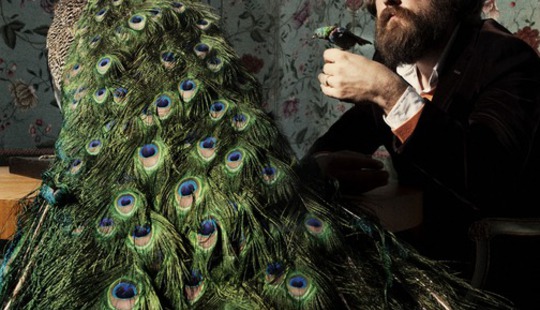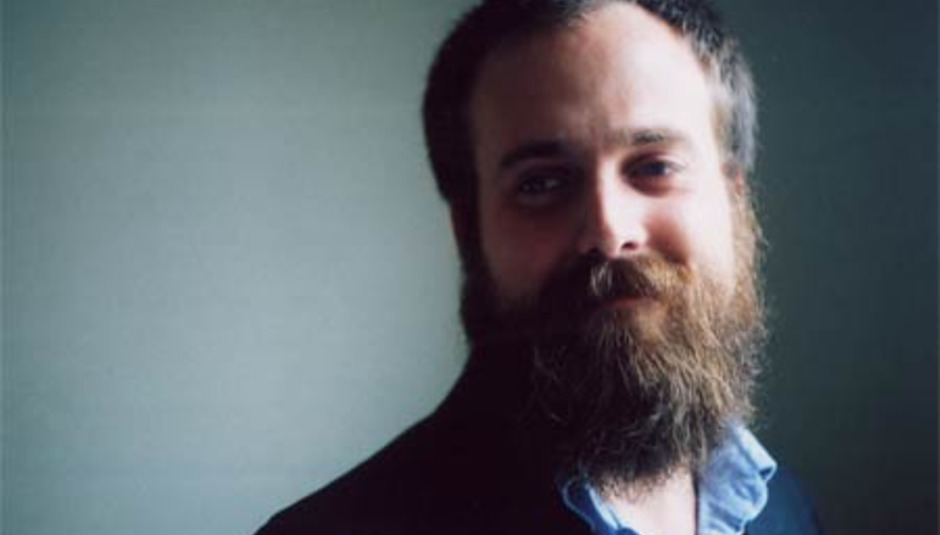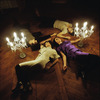It’s hard to get the measure of someone over the phone. As if doing interviews wasn’t an inherently odd enough situation in the first place (you meet someone you don’t know, ask them a series of searching questions regarding their livelihood, then you’re done), doing them over the phone adds a whole new element of strangeness. Without the person actually being there it’s difficult to get a sense of how they really are – if they’re joking or being serious, for example, or even the body language that might tell you it’s time to ask that question, not to ask that question, or come on man: just ask any question.
It is a bit weird, sometimes. But when I called Sam Beam (a.k.a. Iron & Wine) at home in Texas, not even a string of mini-disasters (including a late train, weak connection and some unexpectedly premature Dictaphone batteries) could stop it from being an absolute pleasure, as he advised me to “take a load off” before considering at length how his fourth album Kiss Each Other Clean came to be.
Beam has said in the past that he’s not always comfortable being interviewed, and that he doesn’t understand what writers get from him. Well, I got a sense of real warmth and intelligence, and even though another journalist was calling long before I’d got through my questions – he was that friendly I just wanted to have a nice chat with him, really – hopefully that translates to the page.
In my review of the album I stated that as an artist, Beam “appears to be only just getting started.” What I really mean is that over eight years of releasing music he’s confounded any expectations of what he should sound like, to the point where it’s difficult to say where he’ll go from here. Of course there are constants – his mellifluous vocals and uncanny ability with a lyric spring to mind – but the splashes of colour and limber instrumentation that make up Kiss Each Other Clean is the sound of a group of musicians having a ball, and a beautifully produced, accomplished one at that; not something you might have expected from the hissing tape reels and whispered lines of his 2002 debut The Creek Drank the Cradle. This progression is evident in the live performances included below, and it is part of the reason Beam is one of the best we have.
DiS: So, when did the album get finished up?
Sam Beam: It was almost a year ago…we got pregnant again, so with the baby coming we decided to wait for a while. I think I finished it in March. Yeah, February or March 2010.
DiS: It’s been a while, then…
SB: Yeah, we sat out for a little while. Same thing happened with the last record actually, we were ready to put it out then whoa, another blessing.
DiS: Are you pleased with how it’s all come together?
SB: Yeah, sure! [Laughs] I mean, I wouldn’t put out something I don’t like. But this one was a fun one to make, for sure.
DiS: You’ve mentioned that some friends of yours noted a bit of a Seventies, FM-rock kind of sound…
SB: Yeah, there’s a certain element of that.
DiS: And you’ve also said it’s a bit more focused, maybe.
SB: Well…not necessarily – maybe the recording process. I don’t like the idea of putting out the same record twice, so when it comes to recording them…I could have done it like a quiet, solo acoustic thing, but you know, I had a band and we had these electric pianos and I thought they were sounding fun. So yeah, a bit of it was a throwback to music that I heard growing up, music that I liked. You know, you have all these options of what setting to put your tunes into – it’s fun to put some new clothes on them, and let them strut around the room in their new clothes.
DiS: A song like the last track on the album, [‘Your Fake Name Is Good Enough for Me’] sounds…maybe not so much like a departure, but it’s certainly quite a sprawling…beast of a song.
SB: It’s a little bit unwieldy, yeah.
DiS: Was that more of a studio concoction?
SB: That was actually less of a studio concoction – the only thing that really developed with that one in the studio was the horn section, because I hadn’t imagined doing like a Zappa or Beefheart brass section, which was really fun. It was fun to be surprised, in the process of it. But most of it…well, I’d been writing this song…a lot of these songs; some of them are brand new, but like with all the records, there’s a big mix of really old songs, really new songs and then in between. That one, the first half, I was working on that around The Shepherd’s Dog time, and then the other section was a different song that I’d had for ages, you know, like a listing, Crazy Horse kind of thing.
DiS: It certainly sounds like a song in two halves.
SB: Yeah, and eventually the lyrics sort of brought them together; the lyrics sort of suggested that they should be the same song. And yeah, it definitely went unwieldy at the end, which was fun to do.
DiS: And the album title is drawn from that song as well.
SB: That’s right, yeah, that’s right.
DiS: I can’t remember the exact line – is it the happy kids kissing each other clean?
SB: Yeah, the happy kids, yeah. As kids do, you know; kids from the city, or the kids climbing on cars and kissing each other clean, calling themselves different names that don’t make any sense. But at the same time the line has a…you know, it’s provocative. It has a duality, this both-sides-of-the-coin feel to it, which I thought was true to the record, a bit. When you say we’re kissing each other clean, it suggests that we’re not clean, that something’s fucked up, but that we’re doing something about it. It’s kind of a heavy record, in the sense that it talks about life, and good and bad, and the sweet and the sour, of everything. But at the same time this one’s more of an up-tempo, danceable kind of record, and so I thought that line, that title, kind of played to that.
DiS: …it always makes me think of cats, cleaning each other.
SB: [Laughs] You should try it man, it’s fun!
DiS: You mentioned the horns on the album – was that all Stuart [Bogie] from Antibalas?
SB: Yeah, Stuart did a bunch of it. Also some other fellers from Chicago played more of the stuff on the last song.
DiS: How did you wind up getting him on board?
SB: He’s from Chicago, so we have a bunch of mutual friends. I met him in – he’s in New York now, and we met him there. He grew up with some other people that I’ve been playing with over the years. It’s a small world. You find pretty quickly in the music world, you know – once you meet a couple of people you have access to whoever you want, really.
DiS: You’ve been working with [producer] Brian Deck since Our Endless Numbered Days – it’s a good working relationship, I guess? He’s seen your sound expand a lot…
SB: Yeah, I think it’s been good! We have a good time, I enjoy his company, he’s a good friend and I think he’s a great sounding board. Nothing’s sacred, except something that’s…affecting, in a certain way, you know what I mean? We both have big music collections, and have the same or similar sort of ideas about pop music and I like having him there – you know, because I like to change each record, keep pushing the envelope. I don’t think that my records are avant-garde records by any means, but they definitely push the fanbase. So it’s nice to have someone there who’s been with me along the way, as even the players on the records change a lot, so I can just look over and say, “this is different, right? Have we pushed this far enough?” and he’s like, “I think we can push it farther.” We have a fun camaraderie.
DiS: The first song on the album, ‘Walking Far From Home’, is a series of striking images – it’s really visual. I read somewhere that it really brought to mind, for one writer, Cormac McCarthy.
SB: Oh, okay. Yeah, that’s cool. That’s not bad, getting compared to Cormac McCarthy!
DiS: Not at all! Where did that song come from? Was there any particular inspiration for it?
SB: Well, I had the melody for a long time, and I had this listing thing – I thought it would be fun to do a listing kind of thing. And I couldn’t find a bridge! So the melody just kind of repeats over and over. I was…I think I was in Australia, or New Zealand maybe, so I really was far from home. The line popped up, and then you start filling it in with stuff that you actually see or stuff that you just make up and it becomes…this long list of images, almost like am Eastern mantra. But then it becomes so much like life, you know: you see so many things, and some things mean something and some things don’t, but by the end of it you’ve seen so many things that they all blur together in this big…soup.

DiS: Coming back to the Cormac McCarthy thing – do you read a lot?
SB: Oh yeah, I like to read [laughs]. I think I’ve read most of his books. Right now I’m reading a book called Omensetter’s Luck, by a Midwestern American writer named William Gass.
DiS: The song ‘Tree by the River’, which is a really sweet song, is heavily informed by a sense of nostalgia.
SB: Yeah, definitely. You know, any song that starts with the line “Do you remember…” is insinuating that it’s looking back and pining for the past in some way.
DiS: Do you dwell on the past much?
SB: Well, I guess, yeah. Probably no more than anybody else – I guess we all have things in the past that we would like to revisit, and things that we would like to forget forever; that’s just part of who we are. But it’s a fun premise for the song, ‘cause we’ve all been there. But it’s harder to get it past…it took me a long time to write that song – I’ve been working on that tune for over a decade. You start with a line like that and it has a tendency to be really saccharine. You say, you know, “remember when we went to that restaurant,” or “when we kissed,” that’s only really important to those two people. As an outsider, you or I would be like, “that sounds boring.” But to the point where the guy talks about the roses and the thorns and the rosebush, as an outsider you can glean what you want from it – and that there’s good and bad to everything, all these memories. But I couldn’t let it just be that, I had to put the twist at the end.
DiS: I was curious about the outlaw narrator of ‘Rabbit Will Run’…
SB: You know, it’s the ultimate rationalisation with God. Everybody thinks, “have I been good?” or “what do I deserve? Should I do this, or that?” and you have the mother in there, so there’s some form of guilt. And he compares himself to all these animals, which all carry a different connotation. At the end of the day it’s more about redemption, and whether he feels or deserves or needs to be redeemed. It’s enough of a storyline to hopefully hold people’s interest, but I’m not interested in showing what the guy’s done.
DiS: I got a real sense of struggle, or compromise from it, and the need to overcome that.
SB: Yeah, well, he’s obviously done something. I kind of really treat them [songs] like essays, you know, you just throw in a few elements and stir it up a bit. So this guy’s done something and he obviously has this thing going on with his mom, and these animals all represent different things. He even says, you know, sometimes I’m the lion, sometimes I’m a pig. I’m all these things at the same time. And even the role of the policeman isn’t really cut and dry – he’s not the firm hand of the law: he’s crying, because he relates to this guy.
DiS: There’s so much going on in that song musically as well…
SB: It started as like a six-eight South Western kind of thing, and I took it down some different roads…you push it and push it and push it. And then there’s the marimbas and pianos and percussion. Like a Radiohead in Africa kind of thing [laughs].
DiS: The mother figure in there reminded of me of one of your earlier songs, ‘Upward Over the Mountain’.
SB: Oh yeah, there’s a momma in that one too.
DiS: You’ve got five little girls, I think? And your sister often sings with you, and there’s your wife, of course – you have all these women in your life…
SB: [Laughs] Lucky me!
DiS: And of course you made the Woman King EP as well. Do you think…how does that affect you as a person, having all these females around you all the time?
SB: It’s making me incredibly sensitive! Whether…whether they’re all girls or all boys, having kids changes you. But I’m definitely learning a lot about the feminine perspective.
DiS: How do you find balancing family life with that of a touring musician?
SB: It’s not easy. But luckily I have a really understanding, supportive wife. It manifests itself in the fact that I just don’t go out as much as most people, as I have responsibilities at home. Which is okay with me.
DiS: Christianity is a recurring theme through all of your songs and records. You stated in the past that you’re an agnostic – is that still the case?
SB: Yeah, that hasn’t really changed. I’m not a religious person, but I’m definitely fascinated by religion, and the way it works and the approach it takes. Christianity’s a big deal here, but mostly I like to use aspects of it just because it’s such a big part of our culture.
DiS: It certainly adds a grand kind of context to the songs. Are there any songs that you particularly enjoy playing live, or look forward to?
SB: Not one in particular, but I do have a new band, so it’s always fun to reinterpret songs that you’ve gotten tired of, or just played too many times. It’s always fun to have a new group of people and see what they bring to it. So we end up switching arrangements around a lot – trying to squeeze every little drop of juice out of them.
DiS: I saw the Greene Space performance you did recently, which was supposed to be the new album, but I noticed there were a few songs that aren’t on the album…
SB: Yeah, they said they wanted the whole thing, but I never got that memo! So we played some other tunes too. You can’t let the cat out of the bag too soon, you know?
DiS: I remember seeing you play ‘The Trapeze Swinger’ as your last song at the Green Man festival few years ago – you seemed really overwhelmed by the reception there…
SB: Yeah, I mean, it is really overwhelming, to play a song like that, and have that many people right there with you. The End of the Road festival wasn’t too dissimilar. It was wonderful.
Iron & Wine tour Ireland and the UK this March; Kiss Each Other Clean is out now via 4AD.
March
8 London Roundhouse
9 Brighton Dome Corn Exchange
10 Birmingham Town Hall
11 Edinburgh HMV Picturehouse
12 Liverpool Philharmonic Hall
14 Dublin Olympia
15 Manchester Academy 2
16 Gateshead Sage
17 Leeds Metropolitan University
Photos by Piper Ferguson






















